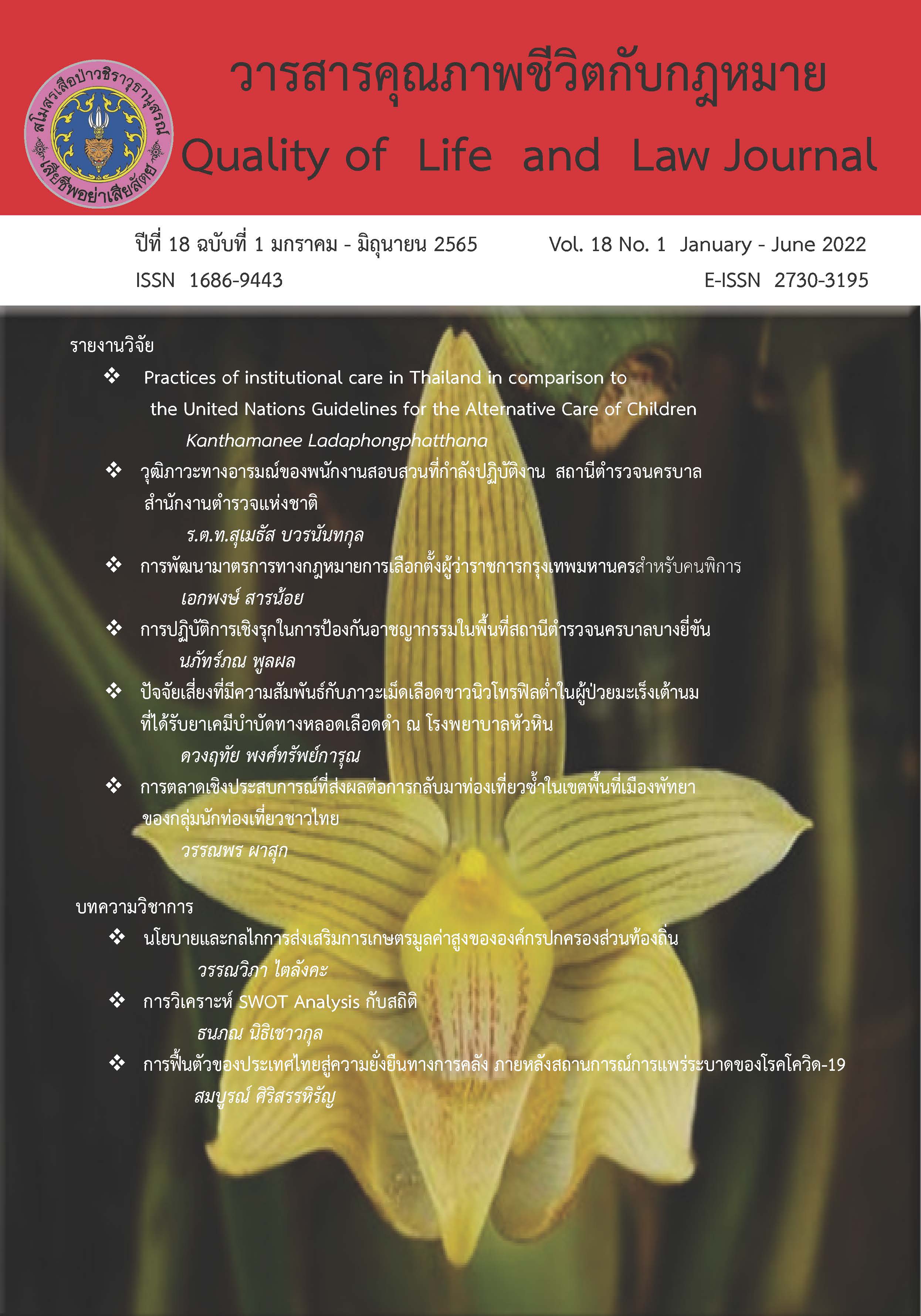Emotional Quotient of Thai Investigative Police in Metropolitan Police Stations
Main Article Content
Abstract
The objectives of this study were to assess Emotional Quotient (EQ) of the Metropolitan police investigator, Royal Thai Police and delineate factors related such emotional maturity. Three hundred and twenty-four Metropolitan investigator police who are working at all Metropolitan police station were the sample in this study. Questionnaire is the research tool in data collecting. Data was analyzed through SPSS Program within Mean, Standard deviation, t – test and F – test and Pearson’s Product Moment Correlation Coefficient including Duncan as category analysis. The research result had revealed as follows;
1. Most of the sample were male, age between 18-30 years got bachelor degree marriage within family income below 50,000 baht and got rank as lower than police inspector performed as the police investigator more than 9 years, care remain burden of their family. On the work duty, there are a few interfere on special criminal case from the superior and influencers, lack of essential materials as while the regulations in working as flexible. In addition, conditions in criminal case are remain effecting on the work frustration obviously.
2.Within the opinion on Emotional Quotient (EQ) of the Metropolitan Investigator police, it was totally high level. The highest was self- esteem awareness. The subordinate was as empathy, self-satisfaction, ability to other relationship, responsibility competency and ability to decision making and problem solving. The moderate was as self-awareness and motivation and ability to own emotion and needs respectively.
3.As for factors related with emotional maturity of the Metropolitan police investigator, there were gender, age, educational background, marital status, time period on investigator police, burden of family feeding, external interfere from the superior and influencer, agency ‘regulations, and criminal case conditions.
4. Suggestions from the study are to survey police burnout, training in the emotional control and competency, workplace improvements, set up a clear career path, provide careers and activities loved more, rules to prevent intervention, including surveying police emotional maturity across the country, managing investigation knowledge and arranging for any police investigators to see a psychologist for a reasonable period of time.
Article Details

This work is licensed under a Creative Commons Attribution-NonCommercial-NoDerivatives 4.0 International License.
- บทความหรือข้อคิดเห็นใดๆ ในวารสารคุณภาพชีวิตกับกฎหมายเป็
- กองบรรณาธิการไม่สงวนสิทธิ์
References
กชกร โฉมแพ (2563) ภาวะความเครียดของพนักงานสอบสวนในสังกัดกองบังคับการตำรวจนครบาล1 วารสารวิจัยวิชาการ, 3(2): 113-124.
ฉัตรชัย ลาพานิชย์ อลงกรณ์ อรรคแสงและศุภสวัสดิ์ ชัชวาล (2561) การแทรกแซงองค์กรตำรวจของนักการเมือง : ศึกษาเฉพาะกรณีตำรวจภูธรจังหวัดร้อยเอ็ด, วารสารช่อพะยอม, 29(2): 199–208.
อิทธิพล กริสว่าง (2553). ปัจจัยที่เป็นแรงจูงใจในการปฏิบัติงานของพนักงานสอบสวนสังกัดกองบังคับการตำรวจนครบาล 6. (วิทยานิพนธ์ศิลปศาสตรมหาบัณฑิต สาขาวิชาการบริหารงานยุติธรรม). คณะสังคมศาสตร์: มหาวิทยาลัยธรรมศาสตร์
Amrita Sidhu, Pretty Bhalla, Inass Said Salamah Ali (2019) Impact of Emotional Intelligence on Quality of Romantic Relationships: Review Research, International Journal of Recent Technology and Engineering 7, Issue-6S5: 774-781.
Jadhav, SG, Havalappanavar, NB (2009) Emotional intelligence and self efficacy of police constable trainees. Indian Psychological Review, 73: 307–314.
Joseph, DL, Newman, DA (2010) Emotional intelligence: an integrative meta-analysis and cascading model. Journal of Applied Psychology, 95: 54–78.
June Price Tangney et. all (2007) Moral Emotions and Moral Behavior Annual, Review of Psychology, 58: 345–372.
Neena Gopalan and Murugan Pattusamy (2020) Role of Work and Family Factors in Predicting Career Satisfaction and Life Success, Int J Environ Res Public Health, 17(14): 5096.
Rubén Trigueros et.all (2019) Influence of Emotional Intelligence, Motivation and Resilience on Academic Performance and the Adoption of Healthy Lifestyle Habits among Adolescents, Int J Environ Res Public Health, 16(16): 2810.
Shamira Malekar and R.P. Mohanty (2009) Factors affecting emotional intelligence: an empirical study for some school students in India Int. J. Management in Education, 3(1): 8 – 28.
Stéphane Côté, Anett Gyurak, and Robert W. Levenson (2010) The Ability to Regulate Emotion is Associated with Greater Well-Being, Income, and Socioeconomic Status Emotion. 10(6): 923–933.
Zeidner, M., Matthews, G., & Roberts, R. (2004). Emotional intelligence in the workplace: A critical review. Applied Psychology: An International Review, 53, 371-399.


